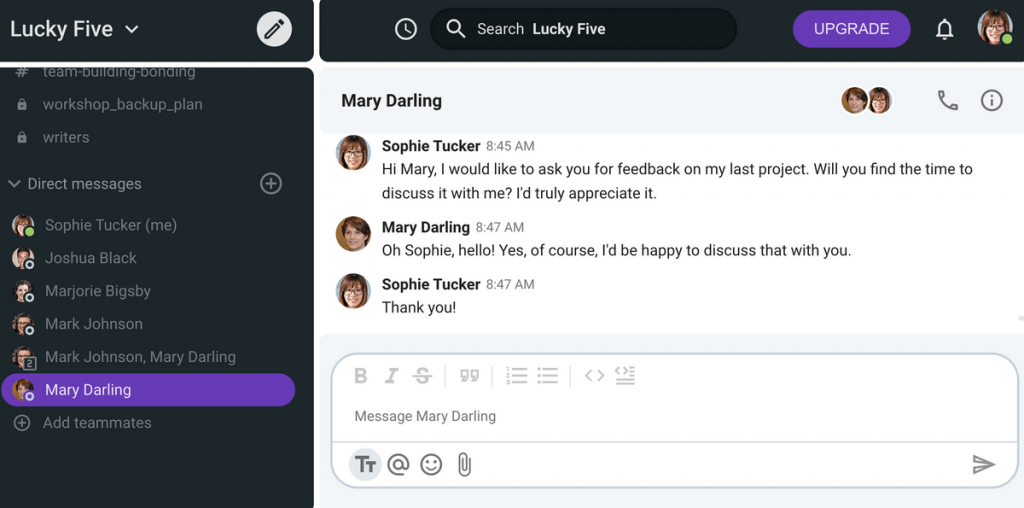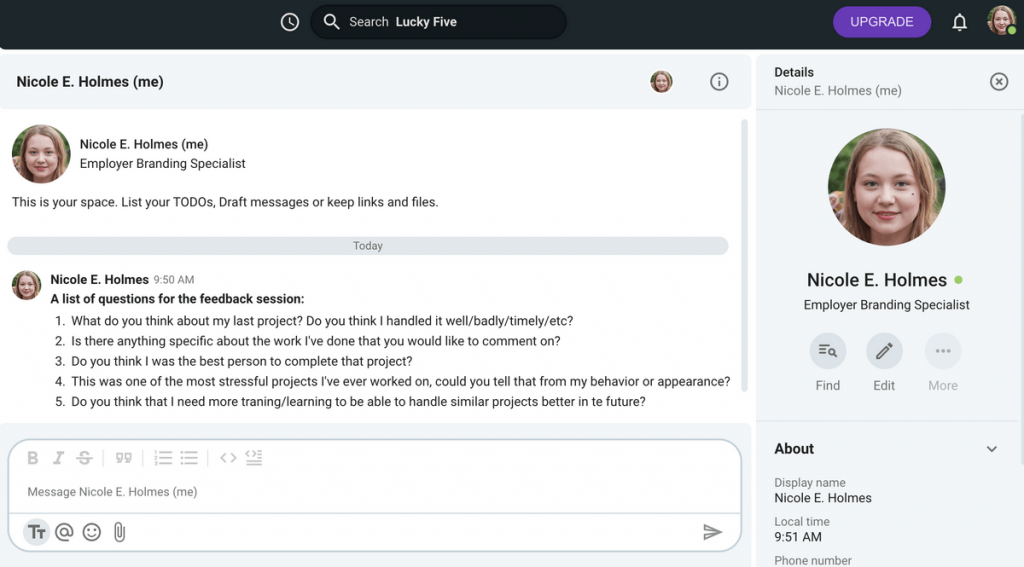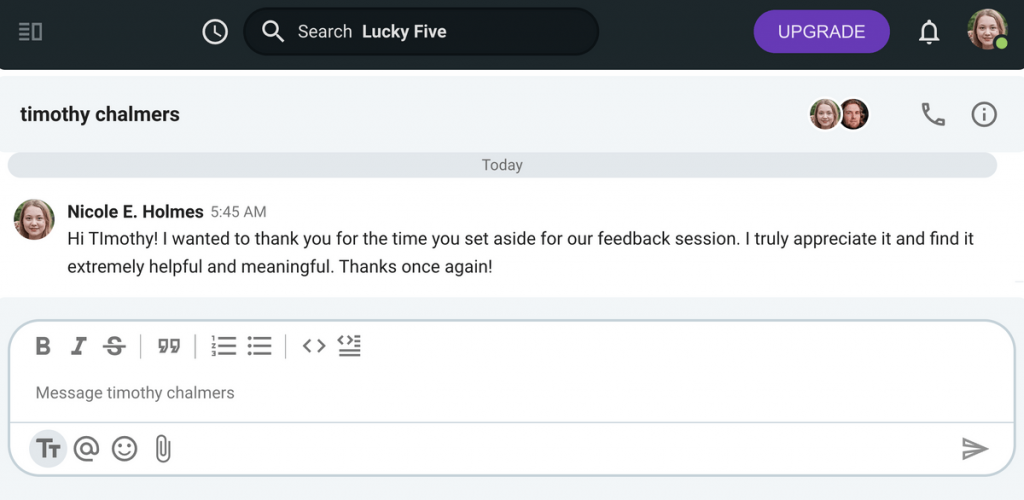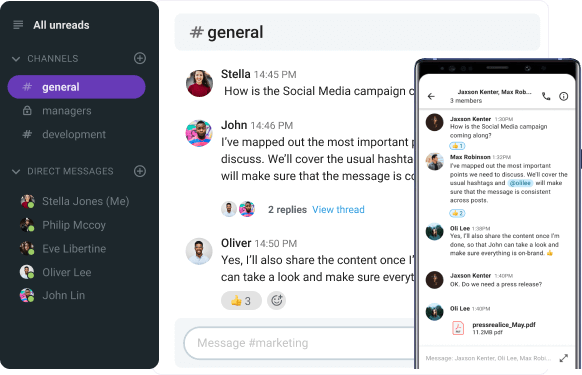Can you guess what Aaron is doing?
- Aaron is extremely stressed, but he appears very calm and ready.
- He keeps on forgetting everything he wrote down.
- He really wants to speak, but the words simply won’t come out.
If your first guess was that Aaron was preparing for a rap contest, I’d say you were close.
However, Aaron is actually preparing to ask his manager for feedback.
For Aaron and the majority of other employees, asking for feedback represents a stressful experience. Surprisingly, they also want more of it, an Officevibe study found — 65% of employees said they wanted more feedback.
With this gap in mind, we’ll devote this blog post to:
- Explaining why it’s important for employees to ask for feedback from their managers and team leads.
- Clarifying why it’s best to ask for feedback directly.
- Listing all the benefits of getting regular feedback.
- Determining the best time to ask for feedback from your manager.
- Outlining some useful tips for asking for feedback from your manager.
Table of Contents
Why is it important to ask for feedback?
Feedback shouldn’t be just a casual, nonchalant chat.
According to Biljana Rakic, our own VP of Human Capital, “feedback should be structured with a certain goal in mind.”
She elaborates:

“Sometimes people interpret casual comments as feedback, but that isn’t feedback. In my opinion, feedback is always constructive. I never refer to it as positive or negative, but always make sure that the feedback is aimed at supporting an employee’s further development. This means that a person can use it to make progress with something they have been doing so far.”
Having the courage to ask for explicit, meaningful, and regular feedback at work is essential because it:
- Reflects your commitment to fine-tuning your skills and further growing in your career.
- Promotes self-awareness and self-acknowledgment.
- Shows your devotion and commitment to contributing to teamwork.
- Represents your desire to succeed and thrive at work.
- Allows you to get an evaluation of your work and learn from your mistakes.
- Highlights what you are doing well and what you should keep doing well.
- Helps your manager or team lead support you better and provide you with better resources for further growth.
- Cultivates honest and transparent communication in the workplace.
- Improves your chances of getting a promotion — because it helps you understand what you need to improve.
- Helps remove the negative stigma around giving and receiving feedback.
The benefits of asking for feedback are many, but let’s dig deeper than this.
In my research, I stumbled upon an article on feedback written by a cognitive scientist.
Here’s what he had to say about the importance of feedback.
Feedback is the core of intelligence
According to Tom Stafford, a cognitive scientist at the University of Sheffield, being able to receive feedback and respond to it is the defining trait of human intelligence.
In the article Stafford wrote for the BBC, he argues:
“Thanks to feedback we can become more than simple programs with simple reflexes, and develop more complex responses to the environment. Feedback allows animals like us to follow a purpose.”
In the context of business and workplace communication, enhanced feedback methods can:
- Help speed up employees’ learning and development.
- Give them purpose and meaning so they can do their best at work in any given situation.
—
Understanding the importance of asking for feedback is the springboard for any employee’s next steps.
Before asking for feedback from your manager, you should know why it’s best to ask for feedback upfront, rather than wait on your manager to give it to you.
Let’s explore that a bit further.
Why is it best to ask for feedback directly?
According to one article exploring the neuroscience behind constructive feedback, our brains are attuned to both physical and social threats.
In the workplace context, social threats can be:
- Having a micromanaging boss,
- Workplace bullying,
- A mean look or gesture,
- Unfriendly emails, or
- Being excluded from important decision-making at work.
On the other hand, physical threats usually refer to physical abuse and any type of conduct that jeopardizes the health and safety of an employee.
In threatening situations like the ones mentioned above, the stress prepares our bodies for survival — we’re either fighting or fleeing. This is called a threat response.
Now, based on various brain scans, neuroscientists have found that we react in the same way to both types of threats:
- Our faces flush,
- Our hearts start beating faster, and
- Our brains start shutting down.
Moreover, research shows that our brains interpret receiving feedback as a major threat.
Asked-for feedback is less stressful than unasked-for feedback
Tessa V West, Katherine Thorson, Heidi Grant, and David Rock conducted an experimental study about feedback to determine how asked-for and unasked-for feedback affect the physiological and psychological states of their participants.
The key takeaway from the study was that asking for feedback was less physiologically and psychologically stressful for both the receivers and the givers of feedback than dealing with unsolicited feedback.
So, for feedback to be more meaningful, productive, and effective — i.e. for feedback not to be perceived as a threat — it’s best to ask for it directly.
The benefits of directly asking for feedback are several — by doing so, we:
- Consciously create a psychologically safe space for ourselves and minimize that threat response.
- Feel greater autonomy and certainty because we are in charge — we have the power to steer the conversation in the direction we want to.
Now that we know that asking for feedback from our superior — rather than waiting for it — is a much better option for us, when is the best time to do it?
Let’s see.
When should you ask for feedback from your manager?
Picking the right time to ask for feedback is important, too.
According to Rakic, feedback should be given in the following situations:
- When something bad has happened — someone has done something that requires a certain reaction and a feedback session.
- When something good has happened — someone has done a great job, e.g. successfully organized an event, and that requires some sort of evaluation or praise.
Another important aspect to take into account when giving feedback is the seniority of the employee in question.
In her words:

“Feedback should be more frequent and practical with people occupying junior positions. With people occupying senior positions in a company, feedback should be less frequent and more strategic, giving direction.
Based on her years-long experience, Rakic believes that feedback should happen at least once every 6 months.
But, you don’t have to wait for something odd to happen to ask your manager to give you feedback. You can weigh in all your options and ask for it whenever you think you need it.
When deciding to ask for feedback, you should make sure to account for other factors, such as:
- The last time you had a feedback session with your team lead/manager.
- The urgency of your need for another feedback session.
How to ask your manager for feedback?
As Rakic sees it, feedback can often be of a punitive nature in some companies — which she considers a harmful practice.
As we’ve already mentioned, receiving feedback often feels like a threat to our brains — this is probably the reason why employees are generally reluctant to be on the receiving end of feedback.
However, with the right mindset and thorough preparation, asking for feedback can be turned into a favorable and enjoyable experience — after all, you are the one in the driving seat this time.
Here are 10 tips you can implement to make it easier to ask for feedback from your manager or team lead.
💡 Pumble Pro Tip
If you’re a manager who needs advice on how to give constructive feedback in a remote work setting, we’ve got some tips for you.
Tip #1: Know why you are asking for feedback
In Rakic’s opinion, it’s crucial that employees know why they are asking for feedback and to understand the purpose of the feedback.
Reasons can vary:

“Do you want a raise?
Do you want to be better at work?
Do you want to understand what you’re doing well and what you’re doing badly?“
To paint a brighter picture, she explained why she usually asks for feedback:

“Personally, when I ask for feedback, I do it for two reasons:
I’m either unsure about what the owner wants to do next, or
I think they don’t appreciate me enough, they don’t see what I’m doing and how much I’m contributing.”
Overall, being clear about why you need feedback will make it much easier for both you and your manager to prepare for it better and deliver effectively.

Tip #2: Take into account the person you’re asking for feedback
Once you’ve set your reasons straight, you should consider the person you are going to ask for feedback.
From Rakic’s perspective, this is an important step for employees who are serious about setting the right tone for the feedback conversation:

“Employees should take into account the character, communication style, and knowledge of their superior.
Is it someone who gives feedback easily or not?
Is it someone who normally likes to talk or ask questions?
Are you asking for feedback from your superior so that they can tell you something?
Or do you want to say something to them?
Perhaps you are asking for feedback because you weren’t given a chance to say something in a specific previous situation.”
Now, how can this step help you?
This can help you not take the feedback too personally and adapt your communication style to the person and the situation — increasing your chances for a pleasant feedback session.
When you know how to behave and communicate with your manager, you’re more likely to avoid miscommunication and communication breakdown.
💡 Pumble Pro Tip
Sometimes, we’ll have to communicate with difficult people at work, which can be challenging but not impossible. Use our tips to prepare for that.
Tip #3: Come up with specific questions in advance
Once you’re clear on the reason behind your asking for feedback, you should make sure to prepare specific questions to ask your manager or team lead.
Why is this step important?
Having questions prepared in advance can help you:
- Maintain focus and not get lost in your thoughts during the conversation.
- Reduce the stress and anxiety that usually emerge during feedback sessions.
- Be in better control of the direction of your feedback conversation.

Tip #4: Schedule a 1:1 meeting with your manager
You know why you need feedback, and you’ve prepared your questions.
You can now move on to the next step — schedule a 1:1 meeting with your superior.
When asking for feedback, it’s always better to do it privately or in a one-on-one meeting.

💡 Pumble Pro Tip
To have a feedback session with your manager, you can use Pumble, a free video-conferencing app. Check out more about the app here:
Tip #5: Prepare for the meeting mentally and emotionally
Even though you’re in control when asking for feedback, it can still be an anxiety-inducing experience. That’s why you should prepare mentally and emotionally for it, too.
This preparation should include getting our emotions in order, Rakic believes. According to her, we should approach feedback in an emotionally neutral way. She elaborates on this:

“Sometimes, certain emotions can make us ask for feedback. It’s important to know which emotion makes us seek feedback — anger, disappointment, excitement, etc.”
However, emotions can cloud our judgment and affect our non-verbal communication, too. Rakic explains this through an example:

“If anger is behind our asking for feedback, our superior will pick up on that because we often communicate our emotions non-verbally.”
Here’s what she advises employees to do:

“You should adjust your emotions to a level that is acceptable for the workplace. You should try to explain the purpose of the feedback, why you need it, and what the next steps are in an authentic, calm, and reasoned manner.”
Tip #6: Make sure to account for different forms of feedback
Rakic prefers not to label feedback as positive or negative. Instead, she chooses to refer to it as pleasant or unpleasant.
When preparing for feedback, you should know that a feedback session can turn either way, regardless of your preparation, initial desire, or goal.
From Rakic’s point of view, pleasant feedback should always be given in front of the team. She explains why this is good:

“Why in front of the team?
First, to make the person feel important and comfortable. Happiness and personal satisfaction are multiplied and spread when shared in front of others.
Second, to show our team what is desirable behavior that contributes to teamwork and leads to praise. Others learn through positive individual examples. It’s a much better way than learning through criticism. It’s better to reinforce good things and good behavior.”
On the other hand, Rakic says that unpleasant feedback should be a private discussion between a manager and their employee:

“Unpleasant feedback, the one that implies that something isn’t done well, is always done one-on-one, never in front of others.”
So, for someone who is on the receiving end of feedback, knowing what to expect from their feedback session can help them:
- Minimize the threat response,
- Decrease the risk of disappointment, and
- Focus on the benefits of feedback for their further growth and development.
💡 Pumble Pro Tip
If you need help preparing for receiving feedback, we have specifically designed worksheets with examples that can help you better understand this entire process. Check them out here:
Tip #7: Take notes during the feedback session
Once you’re in the meeting with your manager, be prepared to take notes — especially if you’ve prepared specific questions for them.
Moreover, Rakic says that one-on-one feedback should include more specific details and emphasize what the person is doing well. This means that you’ll probably have quite a few things to jot down.
By taking notes, you can:
- Show your manager how important this is for you and how much you appreciate their time.
- Make important takeaways and use them as guidelines and future references.
- Avoid forgetting important and useful tips your manager provides you with.
Tip #8: Say thank you to your manager
Once your feedback session is over, you shouldn’t forget to say “thank you” to your superior.
This step is a great way to show how much you appreciate their help and maintain a professional relationship with them, especially if you plan on asking for feedback again in the future.

Now, it can be hard to be grateful if the feedback you’ve received wasn’t what you expected to hear — but you should do it anyway.
Moreover, Rakic believes that employees should always see feedback as a potential for development and be grateful for being able to learn from it.
💡 Pumble Pro Tip
Is it hard for you to establish and maintain professional communication in the workplace? Pick up some helpful tips and tricks from our blog posts:
Tip #9: Use the feedback to improve your work
No matter if the feedback was pleasant or unpleasant, you should consider it the foundation for your further growth and progress. Rakic says:

“From my point of view, feedback should praise exact, specific things that are being done well at the operational level. It should also give suggestions for further improvement. The focus should always be on the good things, the things that can be better, and how they can be better.”
What’s more, she believes that asking for feedback can help employees achieve peace of mind:

“In that certain developmental context, there is always something you can work on. And, when you know that feedback is waiting for you, you can also achieve psychological peace — you are summarizing what you have done and what you have achieved.”
Tip #10: Keep asking for feedback whenever you need it
When employees ask for feedback regularly and that feedback is delivered properly, it’s always a push to do a better job or be a better version of yourself.
There’s always something we can do better, Rakic concludes:

“Feedback helps us round off a certain period. When we say that it is done once every 6 months, we are trying to evaluate those 6 months, see what we have achieved during that time, and what we are doing better now.
So, you had some skills, some experiences, some knowledge, and now you gained these skills and this knowledge, and you know how to do this and that.”
Even though Rakic thinks that feedback should be less frequent with seniors, she recognizes that sometimes, even senior employees need feedback more often.
So, it’s important that both the employee and the manager recognize that internal need for feedback and respond to it.
However, you should feel free to ask for feedback whenever you need it, regardless of your position in the company or the last time you had your feedback session.
Final thoughts: Asking for feedback means taking your career into your own hands
For most of us, feedback is likely to be a stressful and uncomfortable workplace activity. But, that doesn’t mean we should avoid it and not use it to our advantage.
Sometimes, the nerve-racking and awkward experiences can make us leave our comfort zones and make remarkable progress.
When it comes to feedback, I believe that practice makes perfect.
The more you ask for it, the less afraid and stressed you will be while receiving it — especially if the feedback is pleasant, meaningful, and aimed at helping you grow.
Once you take control of how often the feedback happens, you’ll be more comfortable and prepared to hear what your superior has to say.
Instead of waiting for someone to provide you with guidance and advice, showing interest and asking for it proactively will help you take your career into your hands and steer it in the right direction.
Remember — you’re in the driver’s seat!




